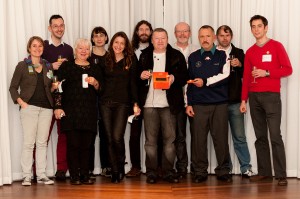On November 1st, 2013, Catalyst officially turned two years old. Like any two year old, Catalyst has seen a lot of growth in such a short time, but also has a long way to go before it is a mature adult. It still needs a lot of nurturing and careful attention paid to it by its dedicated team of parents, principally our project Manager, Debbie, and the team of research assistants, Maria Angela, Will, Stephen and Peter.
As Catalyst lead academic (or the very grand sounding Principal Investigator as we academics like to say), I thought this would be a good time to reflect on what Catalyst has achieved in its first two years. The impact of Catalyst is probably easiest to capture as a list of numbers. In two years, Catalyst has:
- Carried out 11 University-Community research projects
- Created a network of over 90 #catalystas from various Universities and community organisations
- Successfully obtained or contributed to over £600K in follow-on funding for Catalyst research projects (with another £250K currently under consideration)
- Been directly involved in, and made significant contributions to 23 public events outside of Lancaster University. Examples include Manchester Science Festival, the NHS Think-Tech Event, and Fueling Manchester.
- Made 5 Press Releases
- Published 15 academic or non-academic publications (with many more in the pipeline)
- Won 1 award (the Telling Tales of Engagement award from the EPSRC)
- Produced 13 videos, designed to bring our research results to the wider community, and all available on YouTube.
- Given 13 presentations on Catalyst, including 2 invited seminars at UC Berkeley, and at the University of Sao Paulo.
- Facilitated 1000s of conversations between members of the University and members of local, national and international communities.
Of course, the real impact of Catalyst lies not in the numbers but in the hundreds of lives that the project has touched – both positively and negatively. It would be nice to think that Catalyst has had only positive influences on people, but I am the first to admit that some people have found Catalyst difficult, or disagreed with its objectives, or gone along with the excitement only to be ultimately disappointed. On the other hand, there are countless stories of people – from both within the University and outside – who have found themselves thinking differently because of Catalyst, or found themselves able to do something they couldn’t have done by themselves. This is the real success story of Catalyst.
In the coming months, we plan to collect together many of these stories. We have already done this to some extent through our partner video company Ourus, which has produced a very nice set of videos all available on YouTube. However, there are lots more stories left to gather. We plan to commission an external assessor to independently assess the value and impact of Catalyst. And we plan to update our website content in the next 6 months to reflect concrete stories of the impact of the research. We also plan a big jamboree event in September or October of 2014 to showcase all the great things achieved so far.
In the meantime, in anticipation of all those great stories to come, I’ll leave you a quote from one of the people who has been involved in Catalyst: “The most rewarding thing was when we brought one of our service users back from Manchester… he said, ‘there is such a big world out there… I need to do something.’ To me, that summed up what we were about. It’s about opening doors to people that wouldn’t think of walking through them in normal circumstances.” (Sharon Calverley, formerly Director of Operations at Signposts Morecambe. Signposts was a partner in the first Catalyst sprint; unfortunately, since then Signposts lost its funding and was forced to close its doors.)



